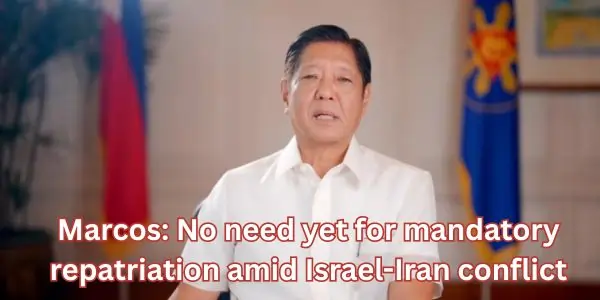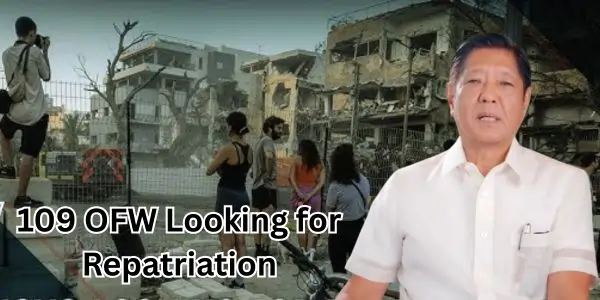President Marcos says no need for mandatory repatriation of Filipinos in Israel for now, as the government closely monitors the Israel-Iran conflict. Contingency plans are ready if needed.

Marcos: No Mandatory Repatriation Yet for Filipinos in Israel Amid Iran Conflict
President Ferdinand “Bongbong” Marcos Jr. announced that there is no immediate need for mandatory repatriation of Filipinos in Israel despite the ongoing Israel-Iran conflict. As tension continues to grow in the Middle East, the Philippine government assures the public that the situation is being closely monitored and that all necessary steps will be taken to protect overseas Filipino workers (OFWs).
Monitoring the Situation Closely
President Marcos made the announcement during a press briefing where he addressed concerns about the safety of thousands of Filipinos living and working in Israel. According to him, the Department of Foreign Affairs (DFA) and the Philippine Embassy in Tel Aviv are working together to keep track of developments in the Israel-Iran conflict.
“We are not yet at the point where mandatory repatriation is needed,” the President said. “Our people on the ground are in constant communication with us. So far, the situation does not call for immediate evacuation.”
The President added that while the conflict between Israel and Iran is serious, it has not yet reached the level where Filipino lives are in direct danger. However, he emphasized that the government is not being complacent.

Safety of OFWs is the Top Priority
The safety and welfare of Filipinos in Israel is the top priority for the Philippine government. The DFA has been in regular contact with OFW communities in the country, making sure they are informed and prepared in case the situation gets worse.
According to DFA officials, advisories have already been issued to Filipino communities. They are urged to stay alert, avoid crowded areas, and follow the guidelines set by the Philippine Embassy and local authorities in Israel.
“We are doing everything to ensure their safety,” said DFA spokesperson Maria Teresita Daza. “We are prepared to repatriate if and when the need arises.”
Contingency Plans in Place
President Marcos also assured the public that contingency plans are already in place in case the conflict escalates and mandatory repatriation becomes necessary. The government is prepared to act quickly and efficiently to bring Filipinos home safely.
Planes are ready to be deployed, temporary shelters have been identified, and coordination with international partners is ongoing. The Israel-Iran conflict remains unpredictable, but the Philippines wants to be ready for any scenario.
“We are not taking any chances,” the President said. “Even though we are not calling for mandatory repatriation yet, our preparations are already ongoing.”
Current Situation in Israel
The current conflict began after Iran launched a series of drone and missile attacks against Israel. These attacks were reportedly in response to earlier actions taken by Israeli forces. In recent weeks, both countries have exchanged threats and warnings, raising concerns of a full-scale war.
While many Western nations have started evacuating their citizens from Israel, the Philippines is taking a more measured approach. The decision to delay mandatory repatriation is based on the latest intelligence reports, risk assessments, and communications from diplomats in the area.
So far, no Filipino casualties have been reported in the conflict.
Filipino Workers in Israel
There are an estimated 30,000 Filipinos working in Israel, most of whom are employed as caregivers, hospital workers, and household helpers. These Filipinos play an important role in Israeli society, and many of them have built lives and careers there.
The Philippine government is aware of their contributions and is doing everything to protect them. Embassy hotlines remain open 24/7, and assistance is available for those who want to return home voluntarily.
“We are not stopping any Filipino who wants to come back to the Philippines,” DFA Secretary Enrique Manalo said. “They can approach the embassy and we will help them.”
Marcos Urges Calm
President Marcos urged the public to remain calm and not to panic. He said the government is doing its job and there is no reason to worry at the moment.
“Let us not add to the fear,” he said. “Let us trust our diplomats and defense experts. They are doing everything to make sure Filipinos in Israel are safe.”
He also reminded the media to avoid spreading unverified news that could cause unnecessary fear among the families of OFWs.
Support from the Government
Aside from mandatory repatriation plans, the government is also working on financial and emotional support programs for Filipinos who might be affected by the Israel-Iran conflict. The Department of Migrant Workers (DMW) said they are coordinating with other government agencies to provide emergency aid, if needed.
This includes food, shelter, medical care, and transportation. The Overseas Workers Welfare Administration (OWWA) has also activated its crisis team to assist in any way possible.
Reactions from the Public
Many Filipinos with loved ones in Israel expressed concern but were comforted by the President’s assurance. Several OFWs also shared that they feel safer knowing the government is monitoring the situation and ready to help if needed.
One caregiver in Tel Aviv said, “We appreciate the President’s message. We hope things calm down soon, but it helps to know that we are not forgotten.”
Conclusion
The Israel-Iran conflict continues to create tension across the region, but the Philippine government remains calm and prepared. President Marcos has made it clear that mandatory repatriation is not necessary at this time, but all precautions are being taken in case the situation changes.
The DFA, DMW, and the Philippine Embassy in Tel Aviv are working hand in hand to monitor developments, provide updates, and protect the lives of every Filipino abroad.
Follow us for more!
